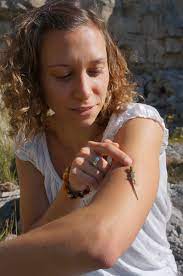Internal talk: What lizards can teach us about evolution

Research talk by researcher Nathalie Feiner (University of Lund, Sweden)
Nathalie is an evolutionary biologist that specialises in development, phenotypic plasticity and hybridisation of lizards, among other topics. She is involved in the Earth Hologenome Initiative.
What lizards can teach us about evolution
Many big questions in evolutionary biology revolve around how novel traits arise and how lineages diversify. With close to 400 species, Anolis lizards offer rich opportunities for studying the processes that shaped their evolution. In this talk, I will present two case studies. The first addresses the developmental genetic basis of a female-limited pattern polymorphism. Our genetic mapping identified a single locus that controls the polymorphism. Characterization of this locus answers why the trait is female-limited despite being autosomal, and how it switches between two discrete pigment patterns. Using agent-based modelling of skin development, we explored the space of cellular dynamics that can lead to the observed polymorphism. Our results are in line with the high level of evolvability observed for these types of pigment patterns. The second study explores the extent to which developmental plasticity has contributed to convergent evolution of habitat specialists. Using a comparative dataset of 270 species and a lab population of lizards raised in extreme environments, we applied 3D-morphometrics to screen for an alignment between evolutionary divergences and plastic responses. Although environmental effects on bone growth are considered promising candidates for plasticity-driven evolution, plasticity is not taking the lead in the adaptive radiation of Anolis lizards.
The talk is arranged by Associate Professor Antton Alberdi from Center for Evolutionary Hologenomics.
